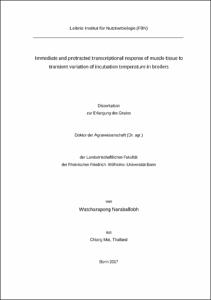Naraballobh, Watcharapong: Immediate and protracted transcriptional response of muscle tissue to transient variation of incubation temperature in broilers. - Bonn, 2017. - Dissertation, Rheinische Friedrich-Wilhelms-Universität Bonn.
Online-Ausgabe in bonndoc: https://nbn-resolving.org/urn:nbn:de:hbz:5n-47316
Online-Ausgabe in bonndoc: https://nbn-resolving.org/urn:nbn:de:hbz:5n-47316
@phdthesis{handle:20.500.11811/7020,
urn: https://nbn-resolving.org/urn:nbn:de:hbz:5n-47316,
author = {{Watcharapong Naraballobh}},
title = {Immediate and protracted transcriptional response of muscle tissue to transient variation of incubation temperature in broilers},
school = {Rheinische Friedrich-Wilhelms-Universität Bonn},
year = 2017,
month = jun,
note = {Eggshell temperature is a critical factor, which can possibly influence immediate and/or long-term gene transcription and expression. Manipulation of temperature (low 36.8°C and high 38.8°C relative to control 37.8 °C) at two specific periods of embryonic development day (ED7-10 or ED10-13) was carried out and microarray-based gene expression profiles were explored in hind-limb and breast muscles. The overall results show tissue-specific patterns of transcriptional changes depending on temperature, day of the treatment and indicate immediate and long-term responses to the aforementioned treatment factors. Interestingly, the high temperature modification at early ED7-10 showed a profound immediate response based on the number of differentially expressed genes (DEGs), while the effect the low temperature was observed more at late ED10-13 compared to early ED7-10. Moreover, the low temperature modification at ED10-13 relative to ED7-10 and compared to other treatment conditions resulted in more DEGs at the day 35 post-hatch sampling stage regarded as long-term effects and implying an involvement of epigenetic mechanisms. microRNA (miRNA) expression analysis was performed to understand post-transcriptional regulation. In silico functional analysis of DEGs and differential miRNAs suggests that acute response to high temperature at ED7-10 for both muscle tissue types elevated mRNA transcripts related to cell maintenance, organismal development, and survival ability such as FABP1 in hind-limb and SMAD3 in breast muscle. Down-regulation of miR-199a-5p, miR-1915, miR-638 in hind-limb muscle and up-regulation of miR-133 in breast muscle were treatment specific and positively influence size of body and myogenesis, respectively. Low temperature condition at ED 10-13 affected reduction on programmed cell death and possibly gained mass of skeletal muscle in hind-limb samples (e.g. NR1H3), while pathways of accelerated cardiovascular system, skeletal-muscular, and connective tissue development were over-represented via the RUNX2 gene in breast. Interestingly, down regulation of let-7, miR-93 and miR-130c in breast was associated with diminished size of bone in type II muscle. Thermal interventions during incubation initiate immediate and delayed transcriptional responses that are specific for timing and direction of treatment. For miRNAs the study shows substantial immediate alterations, whereas late miRNA response was small. The mechanisms mediating considerable phenotypic plasticity contribute to the biodiversity and broaden the basis for managing poultry populations.},
url = {https://hdl.handle.net/20.500.11811/7020}
}
urn: https://nbn-resolving.org/urn:nbn:de:hbz:5n-47316,
author = {{Watcharapong Naraballobh}},
title = {Immediate and protracted transcriptional response of muscle tissue to transient variation of incubation temperature in broilers},
school = {Rheinische Friedrich-Wilhelms-Universität Bonn},
year = 2017,
month = jun,
note = {Eggshell temperature is a critical factor, which can possibly influence immediate and/or long-term gene transcription and expression. Manipulation of temperature (low 36.8°C and high 38.8°C relative to control 37.8 °C) at two specific periods of embryonic development day (ED7-10 or ED10-13) was carried out and microarray-based gene expression profiles were explored in hind-limb and breast muscles. The overall results show tissue-specific patterns of transcriptional changes depending on temperature, day of the treatment and indicate immediate and long-term responses to the aforementioned treatment factors. Interestingly, the high temperature modification at early ED7-10 showed a profound immediate response based on the number of differentially expressed genes (DEGs), while the effect the low temperature was observed more at late ED10-13 compared to early ED7-10. Moreover, the low temperature modification at ED10-13 relative to ED7-10 and compared to other treatment conditions resulted in more DEGs at the day 35 post-hatch sampling stage regarded as long-term effects and implying an involvement of epigenetic mechanisms. microRNA (miRNA) expression analysis was performed to understand post-transcriptional regulation. In silico functional analysis of DEGs and differential miRNAs suggests that acute response to high temperature at ED7-10 for both muscle tissue types elevated mRNA transcripts related to cell maintenance, organismal development, and survival ability such as FABP1 in hind-limb and SMAD3 in breast muscle. Down-regulation of miR-199a-5p, miR-1915, miR-638 in hind-limb muscle and up-regulation of miR-133 in breast muscle were treatment specific and positively influence size of body and myogenesis, respectively. Low temperature condition at ED 10-13 affected reduction on programmed cell death and possibly gained mass of skeletal muscle in hind-limb samples (e.g. NR1H3), while pathways of accelerated cardiovascular system, skeletal-muscular, and connective tissue development were over-represented via the RUNX2 gene in breast. Interestingly, down regulation of let-7, miR-93 and miR-130c in breast was associated with diminished size of bone in type II muscle. Thermal interventions during incubation initiate immediate and delayed transcriptional responses that are specific for timing and direction of treatment. For miRNAs the study shows substantial immediate alterations, whereas late miRNA response was small. The mechanisms mediating considerable phenotypic plasticity contribute to the biodiversity and broaden the basis for managing poultry populations.},
url = {https://hdl.handle.net/20.500.11811/7020}
}






